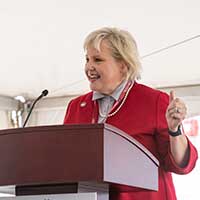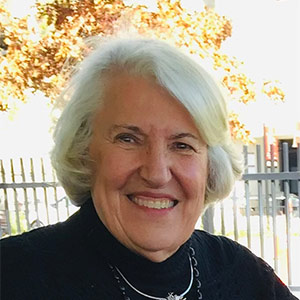Various stages of the building and opening of the new USC nursing facility at Lexington Medical Center
USC, Lexington Medical Center open innovative facility to train nurses
New satellite campus for College of Nursing transforms clinical education experience
The University of South Carolina and Lexington Medical Center opened a new 52,000 square foot facility to train the next generation of nurses during a ribbon cutting ceremony Aug. 12.
Located on Lexington Medical Center’s West Columbia campus, the satellite clinical education building will be used primarily for clinical training of the university’s third- and fourth-year nursing bachelor’s students as well as master’s program students.
Cutting-edge technology and flexible spaces offer USC’s growing nursing student population an elevated educational experience and better prepares them to transition into practice.
South Carolina is expected to have more than 10,000 nursing vacancies by 2030 and has one of the highest projected shortages in the United States. This public-private partnership expands the College of Nursing’s training capabilities and creates opportunities for reducing nursing workforce shortages.
On average, the university awards 900 nursing degrees per year systemwide. Within five years after opening, the new facility will help train and graduate 400 nurses per year in the Midlands—an 80% increase annually.
“We’re proud to partner with the University of South Carolina to directly address the nursing shortage in our state,” said Tod Augsburger, president and CEO. “We are looking forward to growing the pipeline of skilled nurses for our organization and the state while continuing our mission to provide quality health services that meet the needs of our communities.”
Under the partnership, Lexington Medical Center funded the new facility and is providing clinical instructors. Students will benefit from state-of-the-art clinical education and collaboration spaces and private study spaces.

"We’re demonstrating our commitment toward a future that will attract the most promising and talented student and faculty minds.”
An immersive simulation center was designed to employ advanced simulation techniques to replicate clinical scenarios. Spanning the entire second level of the facility, it features several key training areas: the Acute Care Suite, which mimics hospital rooms and intensive care units; the Community Apartment, which simulates a home environment for home health scenarios; the Primary Care Suite, where students practice patient care and communication; and the Skills Suite, where students develop and refine clinical skills. All four areas of the center provide immersive, hands-on learning experiences for students, preparing them for real-world health care settings.
Close proximity to the hospital offers students a wide range of interprofessional education training as well as opportunities for clinical immersion for nurse practitioner students.
“Today, we see our college transformed,” College of Nursing Dean Jeannette Andrews
says. “Our new satellite campus and its cutting-edge technology will elevate what
our students can experience. We’re demonstrating our commitment toward a future that
will attract the most promising and talented student and faculty minds.”
The University of South Carolina’s nationally ranked College of Nursing has a multi-pronged mission of teaching, research, practice, service and policy. As the state’s first nationally accredited nursing program, the college has graduated more than 12,000 nurses since 1957 and continues to attract, retain, train and grow the workforce. A national leader in exam passage rates, the college’s graduates are prepared to address local and regional health needs while improving the accessibility of quality health care.
Meet Marilyn Chassie Sonnenberg
Marilyn Chassie Sonnenberg's motivation to pursue a lifelong career in nursing stemmed from her high school experience as a candy striper, where she recognized her passion for finding ways to improve people’s lives. She grew up watching her mother, a beautician, develop lifelong relationships with clients.

As the first woman in her family to graduate college with a degree in nursing, Sonnenberg also earned her master’s and doctoral degrees before joining USC’s College of Nursing.
Her leadership began with being assistant dean for practice in 1986 and later associate dean for academic affairs and student services in 1990. She has chaired dissertations, served on the Cockcroft Fellowship committee and enjoyed working closely with students as an associate professor.
In discussing the benefits of a new satellite campus, Sonnenberg emphasizes the importance of primary care practices, especially advancing nursing practice and addressing community needs, while also fostering the growth of future nurse practitioners.
She envisions the new campus as a place where technological advancements in health care can align with a focus on patient-centered care.
“Nursing is all based on building a relationship with the patient,” she says. “I hope this is well-incorporated into their education, and that they learn to have a full vision on where to go with the patients.”